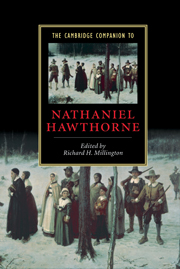Book contents
- Frontmatter
- Introduction
- 1 Hawthorne’s Labors In Concord
- 2 Hawthorne as cultural theorist
- 3 Hawthorne and American masculinity
- 4 Hawthorne and the question of women
- 5 Hawthorne, modernity, and the literary sketch
- 6 Hawthorne’s American history
- 7 Hawthorne and the writing of childhood
- 8 Love and politics, sympathy and justice in The Scarlet Letter
- 9 The marvelous queer interiors of The House of the Seven Gables
- 10 Sympathy and reform in The Blithedale Romance
- 11 Perplexity, sympathy, and the question of the human: a reading of The Marble Faun
- 12 Whose Hawthorne?
- Selected bibliography
- Index
- Series list
6 - Hawthorne’s American history
Published online by Cambridge University Press: 28 May 2006
- Frontmatter
- Introduction
- 1 Hawthorne’s Labors In Concord
- 2 Hawthorne as cultural theorist
- 3 Hawthorne and American masculinity
- 4 Hawthorne and the question of women
- 5 Hawthorne, modernity, and the literary sketch
- 6 Hawthorne’s American history
- 7 Hawthorne and the writing of childhood
- 8 Love and politics, sympathy and justice in The Scarlet Letter
- 9 The marvelous queer interiors of The House of the Seven Gables
- 10 Sympathy and reform in The Blithedale Romance
- 11 Perplexity, sympathy, and the question of the human: a reading of The Marble Faun
- 12 Whose Hawthorne?
- Selected bibliography
- Index
- Series list
Summary
Every one who has considered the subject, knows full well that a nation without fancy, without some romance, never did, never can, never will, hold a great place under the sun.
In this 1853 proclamation, Charles Dickens articulates the nineteenthcentury belief in the importance of fancy in books for children that has remained a guiding assumption about children's literature ever since. “The fairy literature of our childhood,” according to Dickens, significantly affords a “precious old escape”from the world which “is too much with us, early and late.” This is why he objects to his friend George Cruikshank writing temperance messages into fairy tales; Dickens would keep social and political agendas outside the realm of fancy. It might seem odd, then, that he expressly associates fancy and romance with the very worldly institution of nationalism. But the Dickensian defense of fancy astutely recognizes the imaginative character of nationalism: like fairy tales, nations seem to exist independently of the local concerns and interests of their citizens. Nations garner fealty from their inhabitants by convincing them to believe in and find refuge in realms beyond themselves, realms apart from immediate experience.
The fairy stories that Dickens and his contemporaries were writing for juvenile readers thus schooled them in the imaginative dynamics of nationalism. One of those contemporaries in the United States – Nathaniel Hawthorne, who had just published A Wonder-Book for Girls and Boys (1852) – had already identified the crucial role of fancy in nationalism in such 1830s stories as “The Gray Champion” and “Legends of the Province- House.” But Hawthorne from the start saw nationalism not merely as a realization of fancy in which a powerful sense of nation and the practices that strengthen, expand, and perpetuate a nation emanate from a fanciful sensibility. For Hawthorne, any investment that persons develop in places and pasts, in specific countries and histories, proceeds imaginatively. Since nationalism, like other human formations, owes its existence to the imaginative faculty, it registers rather than rationalizes (either positively or negatively) the function of imagination.
- Type
- Chapter
- Information
- The Cambridge Companion to Nathaniel Hawthorne , pp. 121 - 142Publisher: Cambridge University PressPrint publication year: 2004
- 1
- Cited by



